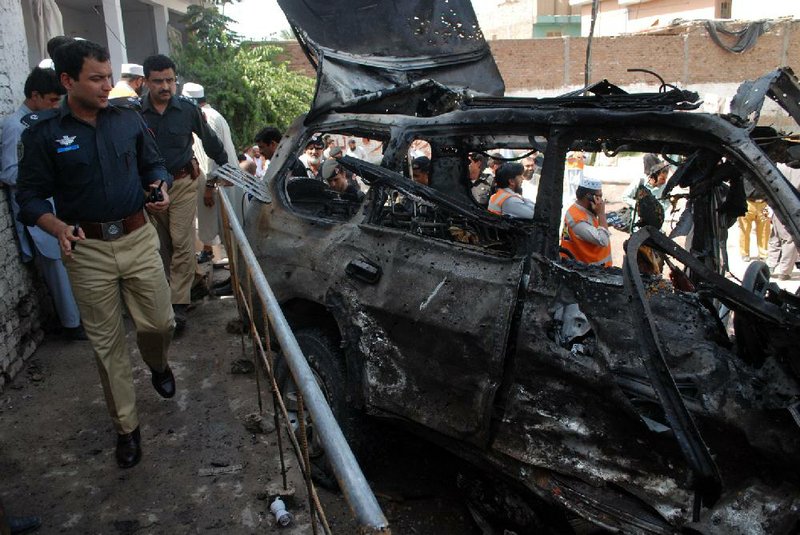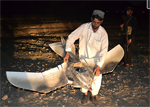ISLAMABAD - President Barack Obama’s speech on the use of drones and the fate of Guantanamo Bay prisoners was largely welcomed Friday in two key countries affected by the policies - Pakistan and Yemen.
But Pakistani officials criticized the president for not announcing an end to drone strikes against Islamic militants in the country in his landmark speech Thursday, as they have long demanded.
Obama cast drone strikes as crucial to U.S. counter terrorism efforts but acknowledged that they are not a “cure-all.” The president also said he is troubled by civilians unintentionally killed in the strikes and announced more restrictive rules governing the attacks - measures that his advisers said would limit drone use in the future.
On Guantanamo, Obama implored Congress to close the detention center in Cuba, and he tried to jump-start the process by announcing a push to transfer approved detainees to their home countries and lifting a ban on transfers to Yemen. The end of Yemeni restrictions is key, given that 30 of the 56 prisoners eligible for transfer are Yemeni.
An adviser to Yemen’s prime minister, Rageh Badi, praised Obama’s decision to lift the ban on the return of Yemeni detainees as a “welcome step” that would improve relations between the two countries.
“This is a responsible speech, especially about the closure of the detention center, which has been an insult to the U.S. more than to any other country,” said Badi.
Obama’s push to close Guantanamo was also welcomed in Pakistan, but the issue has less resonance in the country because there are few Pakistanis left in the prison. Analysts also questioned whether Obama would be successful, given that he promised to close the prison during his first term but failed to do so, largely because of opposition in Congress.
Pakistanis were much more focused on Obama’s comments about drone strikes because the country has been hit by 355 such attacks since 2004. The strikes have killed as many as 3,336 people, according to the New America Foundation, a U.S.-based think tank.
It was the first time the president has spoken extensively in public about the drone program, which is conducted by the CIA in Pakistan and considered classified. Drone strikes in other countries are carried out by the military alone or in cooperation with the CIA, as in Yemen.
The strikes are extremely unpopular in Pakistan, partly because of claims by government officials that the attacks regularly kill innocent civilians - an assessment the U.S. has called exaggerated. Pakistani officials also regularly criticize the strikes as a violation of the country’s sovereignty. Senior civilian and military officials are known to have supported at least some of the attacks in the past, but they claim that is no longer the case.
“Obama has finally responded to the popular sentiment in this country, which is fiercely against the drones, and I think that shows a certain sensitivity,” said Mushahid Hussain, chairman of the defense committee in Pakistan’s Senate. “But for the people of Pakistan, that is not good enough unless there is a cessation of drone attacks.”
Pakistan’s Foreign Ministry reiterated this point in a statement.
“The government of Pakistan has consistently maintained that the drone strikes are counter-productive, entail loss of innocent lives, have human rights and humanitarian implications and violate the principles of national sovereignty, territorial integrity and international law,” the ministry said.
But it also praised Obama for mentioning the thousands of Pakistani soldiers who have died fighting extremists and for acknowledging that force alone will not make the U.S. safer.
“This also has been Pakistan’s longstanding stance that a comprehensive strategy was acquired to address the root causes that foster terrorism and extremism,” the ministry stressed.
According to an unclassified summary of the new guidelines, the U.S. will not strike if a target can be captured, either by the U.S. or a foreign government; a strike can be launched only against a target posing an “imminent” threat; and the U.S. has a preference for military control of the drone program, though the CIA will continue to control the attacks in Pakistan.
Obama also said there must be “near-certainty” that no civilians will be injured or killed in strikes, and they are bound by respect for state sovereignty.
The number of strikes in Pakistan has dropped from a peak of more than 120 in 2010 to about a dozen so far this year.
Meanwhile, the U.S. Embassy said an American diplomat accidentally killed a pedestrian while driving in the Pakistani capital Friday.
The embassy expressed regret for the accident and said it was cooperating with Pakistani authorities in the investigation.
Information for this article was contributed by Ahmed al-Haj and staff members of The Associated Press.
Front Section, Pages 7 on 05/25/2013


